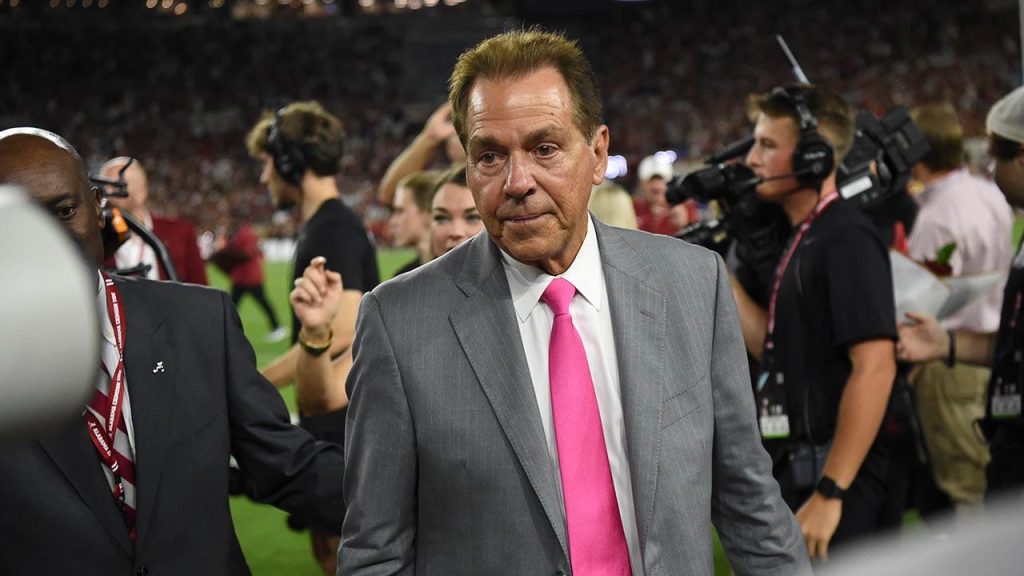The landscape of college football is in constant flux, with the advent of Name, Image, and Likeness (NIL) deals and conference realignments prompting discussions about the sport’s future governance. A significant point of contention revolves around the NCAA’s role, with some advocating for a complete separation and the establishment of an independent governing body for college football. This debate has brought to the forefront the need for strong leadership, capable of navigating the complexities of the evolving collegiate sports landscape. Penn State head coach James Franklin has entered the fray, suggesting a potential candidate for the hypothetical position of college football commissioner: none other than Alabama’s legendary coach, Nick Saban.
Franklin’s endorsement of Saban highlights the desire for a commissioner who prioritizes the best interests of college football as a whole. He envisions a leader who dedicates themselves entirely to the betterment of the sport, making decisions that benefit all stakeholders, from athletes and coaches to universities and fans. Franklin believes Saban’s experience, acumen, and unwavering commitment to excellence make him the ideal candidate to navigate the challenges and opportunities presented by the changing landscape of college football. While acknowledging the potential for Saban to decline such a role, Franklin emphasized the importance of finding a commissioner who possesses similar qualities, someone capable of bringing stability and a unified vision to the sport.
The current structure of college football, still under the NCAA’s umbrella, presents several challenges that coaches and athletic directors have been grappling with for years. Franklin points to issues such as the transfer portal and the scheduling of conference championship games as areas needing reform. He even suggests revisiting the academic calendar, advocating for a renewed focus on academics in the lives of student-athletes. He laments the declining emphasis on academics in discussions surrounding college sports, emphasizing the importance of returning to a model that prioritizes education alongside athletic pursuits.
The transfer portal, in particular, has become a contentious issue, especially with its window open during the bowl season. Coaches like SMU’s Rhett Lashlee have expressed concerns about the disruption it causes to teams preparing for crucial games. The current system allows players to enter the transfer portal during the season, creating a situation akin to “free agency” that disrupts team dynamics and preparation. Lashlee argues that no other sport allows such mid-season transfers and that the current system places undue pressure on student-athletes. He proposes a simple solution: close the transfer portal during December, allowing players to focus on their current team and the postseason. This would eliminate the dilemma of choosing between transferring and participating in bowl games or playoff games.
The current setup also creates a recruiting environment where other programs can actively target players on competing rosters during crucial periods of the season, further exacerbating the issue. This practice not only disrupts team cohesion but also places immense pressure on players to make life-altering decisions while simultaneously trying to focus on competition. The timing of the transfer portal window forces athletes to weigh their future options against their commitment to their current team, creating a challenging and potentially unfair situation. The debate underscores the need for a comprehensive review of the transfer portal rules to ensure a fair and balanced system for both student-athletes and their institutions.
The broader conversation surrounding college football’s future governance extends beyond the transfer portal. Franklin’s suggestion of a dedicated commissioner reflects the growing sentiment that the NCAA’s current structure may not be adequately equipped to handle the evolving complexities of the sport. The increasing commercialization of college athletics, coupled with the emergence of NIL deals and conference realignments, has created a complex landscape requiring strong and focused leadership. The ideal commissioner, in Franklin’s view, would be someone capable of addressing these challenges and charting a course for a more sustainable and equitable future for college football. The discussion surrounding potential candidates, with Saban as a prominent example, underscores the importance of finding a leader with the vision and experience to navigate the turbulent waters of collegiate sports.










